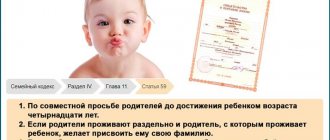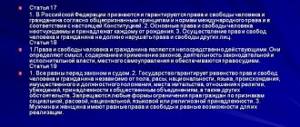Actual marital relations in marriage can be understood as property legal relations and personal non-property legal relations.
Marriage relationships are regulated by moral norms (love, support, friendship). Personal non-property rights cannot be the subject of civil legal relations; they cannot be the subject of contracts, agreements, transactions and do not have a monetary value. Personal non-property rights will not be the subject of a marriage contract; this excludes the conclusion of an agreement between spouses and reduces their rights.
Actual marital non-property relations include:
- place of residence and place of stay;
- giving consent to adoption;
- choice of a surname by spouses upon divorce and marriage;
- choice of profession;
- choice of activities.
At the time of marriage registration, the husband and wife have the right to keep their surnames before marriage, or take the surname of their spouse. As a common surname, spouses can combine each other's surnames by combining them into one. The law prohibits combining surnames if the surname of one spouse is already double; this is provided for in Article 32 of the Family Code of the Russian Federation.
It is important to mention that upon marriage, changing the surname is a voluntary expression of the will of the spouses and is not the responsibility of the persons entering into marriage. The law does not provide for the right of a spouse to demand a change of surname.
The list of questions related to actual marital relations includes:
| Paternity and maternity | Housekeeping | Choice of profession | Freedom to choose your place of residence |
| Children's education | Choice of holidays and leisure activities | Lifestyle choices | Buying a property |
The voluntary choice of spouses in choosing education, profession, housekeeping, lifestyle and place to live is the actual marital relationship of the spouses. The spouses' objections regarding their relationship actually have no legal significance. It is possible to influence your spouse in choosing a profession only through recommendations and advice. The final decision of the spouses in choosing a profession is taken personally by the spouses and should not be dictated or imposed.
Spouses can decide on their place of residence jointly; they can live together or separately. The creation of a family, as well as marriage relationships and their meaning, initially presupposes that a man and a woman live together.
ATTENTION !!!! No one has the right to choose for spouses or limit their places of stay and residence. A change of place of residence of one of the spouses does not oblige the other spouse to change the place of residence.
The place of residence of minor children under 14 years of age is determined by the citizen’s place of residence, where he permanently or primarily resides. In cases where spouses live separately, the question of the place of residence of their minor children is determined by the court, on the basis of paragraph 3 of Article 65 of the Family Code of the Russian Federation, or by agreement of the spouses.
The Family Code of the Russian Federation does not provide for legal punishments for failure to fulfill non-property obligations. At the same time, it should be remembered that neglect of the interests of the family, obstruction by the spouse of the exercise of his personal rights, violation of the rights of the child or other family members can serve as a reason for divorce.
Property marital relations between spouses!!!!
During the period of marriage of spouses, their common property includes property acquired during marriage, which includes:
- income from business activities;
- income from intellectual activity;
- pensions received;
- benefits and other payments;
- payments for damages due to loss of ability to work;
- payments that do not have a specific purpose (amounts of financial assistance).
Thus, the common property of the spouses will be the property obtained from the common funds of the spouses.
The law provides for the following types of common property of spouses:
- movable and immovable things;
- shares in capital;
- funds deposited with credit institutions;
- deposits, securities, bank accounts, shares;
- spouses' wages;
- pensions;
- dividends from securities;
- rent, benefits;
- commissions, industrial designs, utility models;
- royalties;
- winnings from lottery tickets;
- objects of common property rights.
ATTENTION !!!! The spouse who ran a joint household, cared for children, or for other valid reasons did not have independent income, has the right to the common property of the spouses.
If it is established that during the marriage one of the spouses invested a significant part of their money or property in the joint property of the spouses (refurbishment, reconstruction, repairs), such property will be recognized as jointly acquired property.
IMPORTANT!!!! Items purchased for the needs of minor children (musical instruments, sports equipment, shoes, clothing) are transferred to the spouse with whom the minor child will live and are not subject to division.
VUZRU
A marriage concluded in accordance with the established procedure gives rise to rights and obligations of spouses that are varied in content, in other words, relations between spouses. The rights and obligations of spouses arise from the date of state registration of marriage in the registry office (clause 2 of article 10 of the IC).
Relations arising between spouses are divided into personal non-property and property. As has already been noted when considering the subject of family law, for the most part these relationships (especially personal ones) are regulated by moral norms, customs, as well as the ideas that each spouse has about the way of family life.
Personal legal relations of spouses, unlike property ones, have no economic content and are not of a material nature. At the same time, they are decisive, which is due to the essence of marriage as a voluntary union of a man and a woman with the aim of creating a family on the basis of equality of spouses. The relationship between spouses is based on love, mutual respect and responsibility for each other. Legal regulation of personal rights and obligations of spouses is reduced to a minimum and is aimed at ensuring equality of spouses in the family, creating normal conditions for the development of each of them and strengthening the family as a whole. Therefore, the law names only those personal relationships of spouses that can be influenced by the norms of family law. Most of the personal relationships between spouses are outside the scope of legal regulation.[1]
The personal rights and obligations of spouses are closely related to the personalities of the spouses, are inseparable from them and cannot be alienated. They are not affected by the fact that spouses live together or separate. Each spouse may exercise personal rights at their own discretion.
The personal rights and obligations of spouses cannot be terminated or changed by agreement between the spouses. They cannot be the subject of a marriage contract, or any other transactions. This ensures strict observance of the fundamental principle of equality of spouses in the family and excludes the possibility of adopting an agreement that in one way or another diminishes the rights and dignity of one of the spouses.
The named features of personal relationships between spouses and the boundaries of their legal regulation were quite fully substantiated in the theory of Soviet family law, and subsequently in modern legal literature.[2]
It is characteristic that a number of personal rights of spouses enshrined in the IC belong to them as citizens of the Russian Federation even before marriage.[3] Marriage does not limit the spouse’s rights as a citizen of the Russian Federation. At the same time, from the moment of state registration of marriage, personal rights of this kind also begin to act as subjective family rights of each spouse, and therefore are protected by family law. If necessary, the protection of family rights is carried out by the court according to the rules of civil proceedings, and in cases provided for by the IC, by state bodies or guardianship and trusteeship authorities (Article 8 of the IC).
Chapter VI of the IC, consisting of two articles (Articles 31, 32), is devoted to the personal non-property rights and obligations of spouses. In Art. 31 of the Family Code enshrines the principle of equality of spouses in the family, which in turn is based on the provisions of paragraph 3 of Art. 19 of the Constitution of the Russian Federation[4] on the equality of rights and freedoms of men and women. The Constitution of the Russian Federation also establishes that the state guarantees equality of rights and freedoms of man and citizen, regardless of gender, race, nationality, language, property and official status, place of residence, attitude to religion, beliefs, membership in public associations, as well as other circumstances (p 2, 3, Article 19 of the Constitution of the Russian Federation). This equality also extends to family relationships, where spouses have equal personal rights.
Even in pre-revolutionary Russia, where the equality of husband and wife was not recognized as a fundamental principle of family relations, a number of well-known legal scholars proceeded from the need to legislate the equality of spouses in the family. So, in particular, G. F. Shershenevich emphasized that “from the legal concept of marriage and the recognition of personal freedom for every citizen, no matter what class and gender he belongs to, it follows that in personal and property relations spouses should be the same equal and independent, as they were before marriage. Marriage should not have any influence on the position of the spouses, whose legal relations should be the same as between strangers,” and also that “the idea of communication presupposes the equality of the social status of the spouses.”[5]
Equality between spouses in the family presupposes:[6]
a) the right of each spouse to freely choose their occupation, profession, place of stay and residence;
b) joint resolution by spouses of issues of motherhood, paternity, upbringing and education of children, and other issues of family life (the right to jointly resolve various issues of family life);
c) the duty of spouses to build their relationships in the family on the basis of mutual respect and mutual assistance, as well as the duty of spouses to promote the well-being and strengthening of the family, to take care of the well-being and development of their children.
Interference in resolving family issues from the outside, including from close relatives or structures with authority (state authorities, local governments, heads of administration, institutions and organizations), is unacceptable. All problems important to the family are resolved only by the spouses on the basis of their voluntary expression of will on the principles of equality.
Contents of Art. 31 of the Family Code, which reveals the essence of the principle of equality of spouses in the family, fully meets the requirements of Art. 19 (part 2) and 38 of the Constitution of the Russian Federation, art. 16 Universal Declaration of Human Rights, art. 12, 13, 15, 16 of the Convention on the Elimination of All Forms of Discrimination against Women[7], as well as the Beijing Declaration and Platform for Action of the Fourth World Conference on Women (1995) and confirms the general trend to bring the family legislation of the Russian Federation in line with international legal documents. Thus, for these purposes, Federal Law No. 137-FZ of October 30, 1997 ratified the Convention on Equal Treatment and Equal Opportunities for Working Men and Women: Workers with Family Responsibilities, adopted by the 67th session of the General Conference of the International Labor Organization in 1981. in Geneva.[8] Enshrined in Art. 31 of the Family Code, the possibility for spouses to freely choose their occupation and profession corresponds to Art. 37 of the Constitution of the Russian Federation, which proclaims freedom of labor and establishes the right of everyone to freely dispose of their abilities to work, choose their type of activity and profession.
Each spouse, guided by their inclinations, interests, creative capabilities and existing knowledge, independently chooses their type of work activity. Only restrictions of a generally accepted nature are possible, related to the personal qualities, abilities, natural talents and degree of qualification of a citizen applying for a particular type of activity.
Any objections of the other spouse related to such a choice have no legal significance. The exercise of a spouse’s personal right (and this is his constitutional right) to choose his occupation and profession, to one degree or another, may affect the interests of the other spouse or the family as a whole, which presupposes joint discussion by the spouses of this important issue. However, it is possible to influence the other spouse’s choice of profession only by giving advice and recommendations. The right to make the final decision belongs exclusively to each of the spouses individually.
The right of everyone who is legally present on the territory of the Russian Federation to move freely, choose their place of stay and residence is enshrined in Art. 27 of the Constitution of the Russian Federation. This right is not limited only to the territory of the Russian Federation. Spouses have the right to travel outside the state with subsequent unhindered return to the Russian Federation.[9] Restrictions on the rights of citizens of the Russian Federation to freedom of movement, choice of place of stay and residence are permitted only on the basis of law.
Place of residence of the spouse according to Art. 20 of the Civil Code recognizes the place where the spouse permanently or primarily resides. It can be a residential building, apartment, office premises, specialized houses (dormitory, hotel-shelter, house of maneuverable fund, special home for single elderly people, boarding house for the disabled, veterans, etc.), as well as other residential premises, including in which a citizen permanently or primarily resides as an owner or tenant (subtenant) under a lease (sublease) agreement or on other grounds provided for by the legislation of the Russian Federation.
The place of stay means a hotel, sanatorium, holiday home, boarding house, camping, tourist center, hospital, other similar institution, as well as residential premises that are not the place of residence of a citizen, in which he resides temporarily.[10]
Citizens of the Russian Federation are required to register at their place of stay and place of residence within the Russian Federation. However, registration or lack thereof cannot serve as a basis for restriction or a condition for the exercise of the rights and freedoms of citizens provided for by the Constitution of the Russian Federation and federal laws, as well as the constitutions and laws of the constituent entities of the Russian Federation.
In various life situations, it is possible for one of the spouses to change their place of residence for objective reasons (in connection with the performance of professional duties, election to an elected position, the need to undergo a course of treatment, study, etc.). A change of place of residence by one of the spouses does not entail the obligation of the other spouse to also change his place of residence. On the other hand, there is no doubt that the family can effectively fulfill its social role and functions only if the spouses live together, which also creates the most optimal prerequisites for the proper upbringing of children.[11]
It should be noted that the legislation of the Russian Federation provides in a number of cases stimulating conditions for spouses to live together. Thus, when an employee moves, by prior agreement with the employer, to work in another area, the employer is obliged to make compensation payments (expenses for moving the employee, members of his family and transporting property, expenses for settling into a new place of residence) (Article 169 of the Labor Code of the Russian Federation[12 ]). When a spouse moves into the living space of another spouse - the owner of the residential premises, he acquires the right to use the residential premises (Article 292 of the Civil Code of the Russian Federation[13]). The spouse who is the tenant of the residential premises under a social tenancy agreement has the right to move in his or her spouse in the prescribed manner. In this case, the settled spouse acquires an equal right to residential premises with the tenant (Articles 53, 54 of the Housing Code of the Russian Federation[14]).
The right of spouses to jointly resolve issues of family life is very broad in content and covers essentially all aspects of family life: issues of motherhood, paternity, upbringing, education of children, including care for their health, determining the place of study and residence (for example, placing a child in cadet corps or another educational institution), distribution of the family budget, purchases, determination of time and place of rest, etc. Raising children is an equal right and responsibility of parents, as enshrined in Art. 38 of the Constitution of the Russian Federation. All issues related to raising children, as established by Art. 65 of the Family Code must be decided by parents by mutual consent, based on the interests of the children and taking into account the opinions of the children.
The personal non-property right of each spouse (the right to freedom of choice of occupation, profession, place of stay and residence, the right to jointly resolve various issues of family life) corresponds to the duties of the other spouse of a personal non-material nature. They consist in the fact that the spouse is obliged not to interfere with the other spouse in the exercise of his personal non-property rights. In addition, the obligations of the spouses are clause 3 of Art. 31 of the Family Code is required to build family relationships on the basis of mutual respect and mutual assistance, promote the well-being and strengthening of the family, and take care of the well-being and development of their children. Rule clause 3 art. 31 IC is declarative in nature; it essentially lists the moral responsibilities of spouses to each other; following them creates the necessary environment for the normal functioning of all family members both within and outside of it.
The law provides for equality of rights and responsibilities of spouses in the family, without establishing advantages for any of them in resolving any issue. A reasonable approach to the use by each spouse of the personal rights granted by law while simultaneously fulfilling responsibilities will help strengthen the family and mutual understanding between the spouses. The insurance company does not directly provide for sanctions for failure by spouses to fulfill non-property obligations. However, abuse of personal rights or obligations by one of the spouses, obvious neglect of the interests of the family, as well as ignoring or preventing the other spouse from exercising his personal rights can serve as grounds for divorce, and in some cases entails negative consequences for the offending spouse in the property sphere (for example, reduction of the share of this spouse in the common property of the spouses during its division - Article 39 of the Family Code).[15]
The personal non-property rights of spouses include the right to choose a surname upon marriage and divorce.
A citizen's surname performs an important social function of individualizing the individual in society and is included in the passport and other identification documents.[16]
In accordance with paragraph 1 of Art. 32 of the Family Code, choosing at will when entering into a marriage the surname of the other spouse as a common surname or preserving a premarital surname is a personal right belonging to each spouse. It cannot be specified or limited by any conditions. The issue of maintaining or changing one’s last name upon marriage is decided by each spouse independently. The law does not provide for the possibility of participation of other persons, including parents and other close relatives of spouses, in resolving this issue. Facts of unlawful influence and pressure on the spouse entering into marriage using unauthorized methods and means (threats, coercion, restrictions on rights, etc.) may, under certain circumstances and consequences, be regarded as obstruction of a citizen’s exercise of legal rights and freedoms with the involvement of guilty persons to liability established by law.
Spouses exercise the right to choose a surname upon marriage by indicating their chosen surname in the marriage application. As a rule, spouses take a common surname. This surname can be either the husband's surname or the wife's surname. However, each spouse has the right to retain his or her premarital surname upon marriage. During the state registration of marriage, the registry office enters the relevant information into the record of the marriage act and into the marriage certificate, confirming the choice of surname made by the spouses - “surname before marriage”, “surname after marriage” (Articles 29, 30 of the Law on acts of civil status [17]). Changing the surname during state registration of marriage is the basis for replacing the passport as the main document identifying the citizen.[18]
Article 32 of the Family Code also grants spouses the right to be called by a double surname, that is, when entering into a marriage, a spouse can add the surname of the other spouse to his surname, unless otherwise provided by the laws of the constituent entities of the Russian Federation.
Combining surnames is not allowed if the premarital surname of at least one of the spouses is already double. Previously in Russia, the possibility of assigning a double surname to a spouse was not provided for (Article 18 of the Code of Marriage and Family of the RSFSR), which significantly limited the legal rights and interests of spouses, and in some cases created difficulties for certain categories of persons entering into marriage.
The right of spouses to choose a surname is allowed only upon marriage. After state registration of marriage, a change of surname by one of the spouses is carried out in accordance with the general procedure in accordance with the Law on Civil Status Acts. This procedure applies both to cases where one of the spouses, without dissolution of marriage, decided to change the surname of the other spouse chosen at the time of marriage (as a common surname) to a premarital surname, and to cases of changing the premarital surname saved at the time of marriage to the surname of the other spouse.
According to paragraph 2 of Art. 32 of the Family Code, a change of surname by one of the spouses during marriage does not entail an automatic change of surname of the other spouse, since the right to change the surname (first name, patronymic) is a personal right of the spouse and can be exercised only at his request (Article 58 of the Law on Acts civil status). The reasons for a spouse’s decision to change his surname after marriage can be different: the dissonance or difficulty of pronouncing the surname, the desire of the spouse to have a common surname with another spouse or to return his premarital surname, the desire to bear the surname of the stepfather (stepmother) who raised him, the desire to bear the surname and name, corresponding nationality, etc.
In accordance with paragraph 2 of Art. 58 of the Law on Acts of Civil Status, a change of surnames, names, patronymics (hereinafter referred to as the change of name) is carried out by the registry office at the place of residence or at the place of state registration of birth of the applicant. The spouse's written application for a name change must be accompanied by: the applicant's birth certificate; marriage certificate; birth certificate of children (if the applicant has minor children).
The application for a name change itself shall indicate: the reasons for the name change; last name, first name, patronymic, date and place of birth, citizenship, nationality (optional), place of residence, marital status of the applicant; surname, name, patronymic of each of the applicant’s minor children; details of civil registration records previously compiled in relation to the applicant and each of his minor children; surname, first name and (or) patronymic chosen by the person wishing to change his name (Article 59 of the Civil Status Law).
The registry office considers an application for a name change within a month from the date of filing the application, but if there are valid reasons (failure to receive copies of civil status records that need to be changed, the need to restore a civil status record, etc.), the period for consideration of the application may be increased head of the registry office for no more than two months. The registry office, when satisfying the applicant’s request to change his name, does not have the right to demand that he adopt the name chosen by the registry office. The applicant is notified of the decision made by the registry office. If the change of name is refused, the documents received from him will be returned to the applicant. The head of the registry office is obliged to provide the reason for the refusal in writing. In accordance with Art. 60 of the Law on Acts of Civil Status on the state registration of a change of name, the registry office informs the internal affairs body at the place of residence of the applicant within seven days from the date of state registration of the change of name.[19]
A refusal to state register a change of name can be appealed by an interested person to the executive authority of a constituent entity of the Russian Federation, whose competence includes organizing activities for state registration of acts of civil status, or to a court.
In connection with the registration of a change of name by the registry office, the necessary changes are made to the civil status records previously compiled in relation to the person who changed the name (including the record of the marriage act), and the registry office issues new certificates of state registration of civil status acts, as well as a certificate of change of name (Article 63 of the Civil Status Act).
Upon divorce, each spouse also has the right to independently and independently resolve the issue of their surname. According to paragraph 3 of Art. 32 of the Family Code, upon divorce, spouses have the right to retain their common surname or restore their premarital surnames. It is important that the consent of the spouse whose surname is retained by the other spouse is not required for this.
The personal right of a spouse to preserve a common surname after divorce cannot be challenged even in court. A spouse who wishes to be assigned a premarital surname must declare this to the registry office during the state registration of divorce before issuing a divorce certificate. In this case, the surname that the spouse bore before entering into the marriage is considered premarital (both the surname he received at birth and the surname from a previous marriage). The registry office makes a corresponding note in the entry on the divorce deed regarding the assignment of a premarital surname to the spouse. If a spouse, upon dissolution of marriage, retained the surname chosen by him at the time of marriage, then the change of his surname to a premarital one is made at the registry office on a general basis upon a separate application.[20]
These rules apply regardless of the procedure for divorce: in the registry office or in court. In a court decision to satisfy a claim for divorce, the surnames of the spouses are recorded in accordance with the marriage certificate, and the right to choose a surname is exercised by the spouses in the registry office upon receipt of the divorce certificate.
The personal non-property rights of spouses should also include those not mentioned in Chapter. VI IC the right of each spouse to give consent to the adoption of a child by the other spouse, if the child is not adopted by both spouses (Clause 1, Article 133 IC).
The spouse’s right to divorce is personal (Clause 2, Article 16 of the Family Code). Their content will be revealed in subsequent chapters of the textbook.
The principle of equality of spouses in the family, which implies vesting them with personal rights and responsibilities, is characteristic not only of our country. The main international legal documents in the field of human rights (the Universal Declaration of Human Rights of December 10, 1948 and the International Covenant on Civil and Political Rights of December 16, 1966) state that states must take measures to ensure equality of rights and obligations of spouses in regarding marriage, during marriage and upon its dissolution. Therefore, the equality of rights of spouses in the family is enshrined not only in Russian family law, but also in the legislation of most foreign countries, including their constitutions. [21]
[1] Pchelintseva L. M. Family law of Russia: Textbook for universities. M.: Norma, 2004.P. 173.
[2] Antokolskaya M.V. Family law: Textbook. M.-Yurist, 2002. P.146.
[3] Chefranova E. A. Property relations in the Russian family. M., 1997. P. 7.
[4] Constitution of the Russian Federation (adopted by popular vote on December 12, 1993), current version as of August 1, 2014 // Rossiyskaya Gazeta dated December 25, 1993. No. 237; Collection of legislation of the Russian Federation. 2014. No. 31.
[5] Shershenevich G.F. Russian civil law St. Petersburg, 1894. P.426.
[6] Pchelintseva L. M. Family law of Russia: Textbook for universities. - M.: Norma, 2004.P.175
[7] Convention on the Elimination of All Forms of Discrimination against Women (New York, December 18, 1979) / Collection of Legislation of the Russian Federation. 1997. No. 44.
[8] Convention on equal treatment and equal opportunities for men and women workers: workers with family responsibilities (adopted by the ILO in 1981 in Geneva) / Collection of legislation of the Russian Federation. 1997. No. 48.
[9] Federal Law of August 15, 1996 No. 114-FZ “On the procedure for leaving the Russian Federation and entering the Russian Federation” / SZ RF. 1996. No. 34, art. 2, 15.
[10] Law of the Russian Federation of June 25, 1993 No. 5242-1 “On the right of citizens of the Russian Federation to freedom of movement, choice of place of permanent residence and residence within the Russian Federation”, current version as of January 5, 2015 / Gazette of the Congress of People's Deputies and the Supreme Council of the Russian Federation. 1993. No. 32. / Collection of legislation of the Russian Federation dated January 5, 2015 No. 1 (part I)
[11] Pchelintseva L. M. Family law of Russia: Textbook for universities. - M.: Norma, 2004. P.177.
[12] Labor Code of the Russian Federation dated December 30, 2001 No. 197-FZ, current edition as of January 5, 2015 / Collection of Legislation of the Russian Federation 01/07/2002, No. 1 (part 1); / Collection of legislation of the Russian Federation 01/05/2015, No. 1 (part I).
[13] Civil Code of the Russian Federation (part one) dated November 30, 1994 No. 51-FZ, current edition as of January 1, 2015 / Collection of Legislation of the Russian Federation, December 5, 1994, No. 32, Art. 3301; /Collected Legislation of the Russian Federation, 05/13/2013, No. 19, Art. 2327.
[14] Housing Code of the Russian Federation dated December 29, 2004 No. 188-FZ, current version as of December 31, 2014 / Collection of Legislation of the Russian Federation, 01/03/2005, No. 1 (part 1) / Collection of Legislation of the Russian Federation, 01/05/2015, No. 1 (Part I).
[15] Family law of the Russian Federation: educational method. complex / E. L. Nevzgodina, N. A. Temnikova; (Editor-in-chief V. L. Slesarev); Ohm. state University named after F. M. Dostoevsky. - Omsk: Omsk State University Publishing House, 2013. P.107.
[16] Description of the passport form for a citizen of the Russian Federation, approved by Decree of the Government of the Russian Federation of July 8, 1997 No. 828 / SZ RF. 1997. No. 28, paragraph 9
[17] Federal Law of November 15, 1997 No. 143-FZ “On Acts of Civil Status”, current version December 31, 2014 / Collection of Legislation of the Russian Federation, November 24, 1997, No. 47 / Collection of Legislation of the Russian Federation, 01/05/2015, No. 1 (Part I).
[18] Pchelintseva L. M. Family law of Russia: Textbook for universities. - M.: Norma, 2004. P.180
[19] Pchelintseva L. M. Family law of Russia: Textbook for universities. - M.: Norma, 2004. P.181.
[20] Family law of the Russian Federation: educational method. complex / E. L. Nevzgodina, N. A. Temnikova; (Editor-in-chief V. L. Slesarev); Ohm. state University named after F. M. Dostoevsky. - Omsk: Omsk State University Publishing House, 2013. P.110.
[21] Pchelintseva L. M. Family law of Russia: Textbook for universities. - M.: Norma, 2004. P.184.






